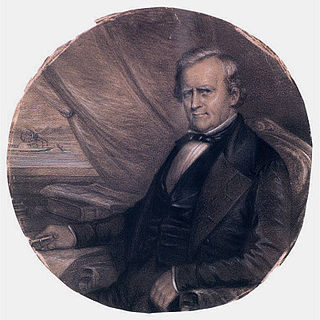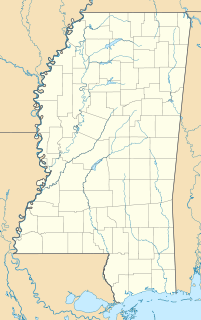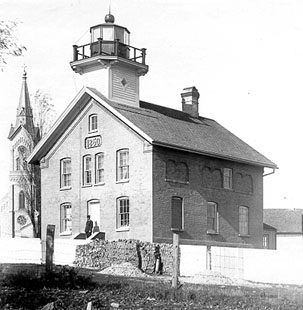
Ozaukee County is a county in the U.S. state of Wisconsin. As of the 2010 census, the population was 86,395. Its county seat is Port Washington.

Issaquena County is a county located in the U.S. state of Mississippi. As of the 2010 census, the population was 1,406, making it the least populous county in the United States east of the Mississippi River. Its county seat is Mayersville. With a per-capita income of $18,598, Issaquena County is the poorest county in the United States.

Henry Miller Shreve was the American inventor and steamboat captain who opened the Mississippi, Ohio, and Red rivers to steamboat navigation. Shreveport, Louisiana, is named in his honor.

Lewis Cass was an American military officer, politician, and statesman. He represented Michigan in the United States Senate and served in the Cabinets of two U.S. Presidents, Andrew Jackson and James Buchanan. He was also the 1848 Democratic presidential nominee and a leading spokesman for the Doctrine of Popular Sovereignty, which held that the white people in each territory should decide whether to permit slavery.

The Natchez Trace, also known as the "Old Natchez Trace", is a historic forest trail within the United States which extends roughly 440 miles (710 km) from Nashville, Tennessee, to Natchez, Mississippi, linking the Cumberland, Tennessee, and Mississippi rivers.

The Northern Neck is the northernmost of three peninsulas on the western shore of the Chesapeake Bay in the Commonwealth of Virginia. This peninsula is bounded by the Potomac River on the north and the Rappahannock River on the south. It encompasses the following Virginia counties: Lancaster, Northumberland, Richmond, and Westmoreland.

The Territory of Wisconsin was an organized incorporated territory of the United States that existed from July 3, 1836, until May 29, 1848, when an eastern portion of the territory was admitted to the Union as the State of Wisconsin. Belmont was initially chosen as the capital of the territory. In 1837, the territorial legislature met in Burlington, just north of the Skunk River on the Mississippi, which became part of the Iowa Territory in 1838. In that year, 1838, the territorial capital of Wisconsin was moved to Madison.

The Province of North Carolina was a British colony that existed in North America from 1712 to 1776, created as a proprietary colony. The power of the British government was vested in a governor of North Carolina, but the colony declared independence from Great Britain in 1776. The Province of North Carolina had four capitals: Bath (1712–1722), Edenton (1722–1743), Brunswick (1743–1770), and New Bern. The colony later became the states of North Carolina and Tennessee, and parts of the colony combined with other territory to form the states of Georgia, Alabama, and Mississippi.

Cotton Gin Port is a ghost town in Monroe County, Mississippi, United States.

Joseph Martin, Jr. (1740–1808) was a brigadier general in the Virginia militia during the American Revolutionary War, in which Martin's frontier diplomacy with the Cherokee people is credited with not only averting Indian attacks on the Scotch-Irish American and English American settlers who helped win the battles of Kings Mountain and Cowpens, but with also helping to keep the Indians' position neutral and from siding with the British troops during those crucial battles. Historians agree that the settlers' success at these two battles signaled the turning of the tide of the Revolutionary War—in favor of the Americans.

Lock and Dam No. 20 is a lock and dam located on the Upper Mississippi River, about one mile upstream from Canton, Missouri.
Anderson House may refer to:

Colonel George Davenport, born George William King, was a 19th-century English-American sailor, frontiersman, fur trader, merchant, postmaster, US Army soldier, Indian agent, and city planner. A prominent and well-known settler in the Iowa Territory, he was one of the earliest settlers in Rock Island. He spent much of his life involved in the early settlement of the Mississippi Valley and the "Quad Cities". The present-day city of Davenport, Iowa, is named after him.
Events from the year 1805 in the United States.

The Port Washington Light is a historical lighthouse in Port Washington, Wisconsin. Replaced by the Port Washington Breakwater Light and converted to a normal dwelling, it was restored with the assistance of the Grand Duchy of Luxembourg and currently serves as a museum.

Princeton is a ghost town located in Washington County, Mississippi, United States.

Van Buren is a ghost town located in Itawamba County, Mississippi.
The North Carolina General Assembly of 1783 was the state legislature that convened in Hillsboro, North Carolina from April 18, 1783, to May 17, 1783. Members of the North Carolina Senate and the North Carolina House of Commons were elected by eligible North Carolina voters. This was the last assembly to meet during the American Revolution. Much of their time was devoted to taking care of the North Carolina soldiers that fought in the war.















